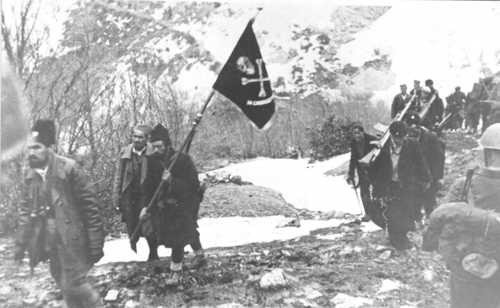The fight against the Axis was undertaken as long as it was perceived to be in the way of their own plans.
Naturally, the NDH was the prime enemy for disintegrating "their" Yugoslavia, second Germany for backing NDH and then Hungary and Bulgaria for annexing parts of Yugoslavia with high Serb population. Italy was never really seen an enemy - I do not recall to have read of a single conflict with Italian forces during the war. Italy-backed Albania, which was to annex Kosovo, was however perceived as an enemy for said annexation.
Collaboration with Italy started right away, having the same goal for different reasons of removing non-Serb and non-Italian population in the Italian area of operations. Četniks would be legalized and taken over into the Italian armed forces as MVAC (Milizia Volontaria Anti Comunista - Anticommunist volunteer militia), they would be supplied with arms and ammunition and would in return closely cooperate with the Italians.
In 1941 during the great Uprising in Serbia, the Četniks and the Partisans (the Communist Partisans - usually called simply "Partisans" when talking about WW2 in Yugoslavia, the wording "Četnik partisans" is highly unusual and will mostly create only confusion) would cooperate, albeit this cooperation would prove to be uneasy from the start, with occassions of assassinations taking place, as the Četniks were highly against an inclusion of non-Serb elements in the resistance movement. The Četniks would offer the Germans in October 1941 full cooperation against the Partisans in exchange for weaponry. The Germans declined and demanded full disarming of all Četnik forces instead (safe for formations like those of Kosta Pećanac who were already working for the German-backed Nedić-government). Mihailović refused and tried to prove usefulness for the Germans by attacking the so-called Republic of Užize and handing over captured Partisans, which were subsequently shot by the Germans.
However, the Germans did not change their position largely, still demanding the dissolution of Četnik forces. On another side they had much more success. In the beginning of 1942, after a very heavy series of fighting between the Ustaše on one side and the Četniks on the other, those two parties made a number of agreements in several areas. In those agreements the Ustaše and the Četniks agreed to cooperate militarily and in a few other areas (logistics etc.) One reason for those agreements was the realization that the Partisans could and did draw manpower from any demographic and that they would overthrow them both if nothing was undertaken. While this alliance proved to be quite difficult, it was maintained right till the end of the war, with a number of incidents (like after the Italian capitulation in 1943).
Thus, the Germans were more and more presented with a fait accompli, as two of their allies were already working with the Četniks (Italy and NDH). Up to 1943, the Germans were however not very interested in a cooperation with the Četniks, aware of their strong flirt with the Allies, hoping that in case of an Allied invasion they would be treated as the legitimate resistance force in Yugoslavia and would be given preference over Tito and his communist Partisans. From time to time they did receive weapons by the British (as did the Partisans), but the British became more and more concerned of their collaboration with the Axis. Mihailović himself told a British agent already in 1941, that his enemies are the Partisans, the Ustaše, the Muslims (today Bosniaks), the Croats and then the Germans and Italians - in that order.
Therefor, the Germans continued to disarm Četniks from time to time. The Četniks on the other hand hoped to gain support from the Germans and would thus refrain from offensive actions against the Germans.
In 1943 Germany changes it’s stance to the Yugoslav front. The reason is the gain of power by the Partisans, who now posed a threat to the communication lines Zagreb-Belgrade. Germany raises it’s involvement. After Italy’s capitulation, Germany, who distrusted the Četniks so far, openly embraces them, needing any possible ally in the fight against the ever-growing threat of the Partisans, especially with a possible Allied invasion in the Balkans in mind. The Germans embedded Četniks in their units and provided them with weapons.
Like with the case of cooperation with the NDH, things did not always go smoothly between the Germans and the Četniks, however the cooperation kept growing, the more obvious it was that the Četniks had little other options.
On a side note, Churchill never stopped preferring the royal family. He actually coerced Tito into signing an agreement which would allow the return of the royal family to Yugoslavia. The events of the war simply changed this "small little detail".

